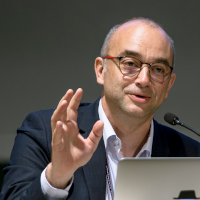
I am VP Ecosystem Development of the Eclipse Foundation, where I work on engaging with more individuals and companies to adopt proper open source governance and promote their open source project.
I have been working in Open Source for the last 18 years in various roles: as an entrepreneur, as a business developer and as a community builder.
I learnt the ins and outs of building a business on top of an open source project when I co-founded a startup that was developing an Open Source Enterprise Service Bus in 2004-2010. At that time, I also participated in the creation of OW2.
I joined the Eclipse Foundation in 2013 with the creation of PolarSys, an initiative of industrial companies (Airbus, Thales, Ericsson, …) to create an ecosystem around open source development tools dedicated to the development of embedded systems. This was one of the first initiatives of this kind at the Eclipse Foundation and that set the stage for other similar industry collaborations at the Eclipse Foundation.
In 2021, I participated in the creation of the OSPO Alliance as a fully open initiative to help companies discover and better understand open source, and approach the creation of an OSPO.
In 2021, and again in 2022, I am leading the program committee of Open Source Experience, in Paris, which is one of the main Open Source event in Europe.
How the candidate will contribute to the board
As Open Source is becoming more and more adopted, we see several challenges from people and organizations who try to redefine it, play with the words, as well as with properly onboarding new stakeholders who are less familiar with the history of open source and software. By joining the OSI board of directors, I want to focus on three important aspects:
Firstly, the OSI should leverage more its network of OSI members to communicate the OSD to a wider audience and to make sure that all the stakeholders understand the core concepts and don’t get fooled by organizations that claim to be open to confuse users, but play with words.
Secondly, Open Source should be seen as the best way to implement open standards as it helps foster interoperability and adoption. But lots of standard organizations adopt IPR rules, like FRAND, that are not compatible with the OSD and the Open Standard Requirements. We need to stand for the OSR and the OSD, and work with the standardization bodies, as well as with the companies, to make sure that they enable open source implementations.
Finally, I think that OSI needs to onboard more supporters to sustain and develop its activities. When you look at the current list of supporters, it appears that there should be room for recruiting more sponsors, for example from Europe.
Why the candidate should be elected
In the last few years, I have been talking in numerous conferences about the opportunity of a larger adoption of open source by industry players, leveraging the OSD as the common ground for worldwide collaboration between companies and individuals.
I have been an individual member of the OSI for >10 years, and advocating for the OSD in my professional activities for the last 10 years, considering it as our constitution.
I would be honored to serve the larger community, and to bring my experience, my network, as well as a fresh point of view to the board (as it would be my first time on the board of the OSI).

.jpg)
Comments
Submitted by gblondelle on Sun, 2022-03-13 11:30 Permalink
My answers to the questions from Luis Villa
I posted these short answers on twitter, but I think it would be useful for the voters to get the answers here when voting. Do not hesitate to comment if you have any questions.
Q1: What should OSI do about the…millions of people who… collaborate to build software online (often calling that [collaboration] open source) but have…no idea what OSI is or what it does?
GB: I use a Macbook and, unfortunately, my organization selected Google Suite and Zoom a few years ago. I primarily use Chrome (at work) and Firefox (at home), as well as Thunderbird. Development with the Eclipse IDE. Media processing with OBS, kdenlive, Gimp and Audacity.
Q2: What should OSI’s relationship to the Organization for Ethical Source and Free Software Foundation (and their relevant movements) be?
GB: I think OSI should try to engage with the FSF and the Ethical source movement. We may want to join forces on some topics, and we should collectively document our convergences and our disagreements so that the larger ecosystem can better understand it.
Q3: What *additive* skills/perspectives do you bring to the board? This could be finance/money, ED/staff management, non-Valley/EU perspective… many options
GB: I bring a European perspective, skills to onboard the industry (I mean non software vendors) to open source ecosystems and a strong willingness to see the OSI spread the word to new stakeholders who hear that OSS enables technology independence but don’t necessarily understand the "why" and "how".
Q4: OSI is in process of shifting from a board-driven to a staff-driven org. How do you plan to support that transition in particular, and OSI’s staff more generally?
GB: Being part of the executive team of the Eclipse Foundation, I understand the ins and outs of staff-driven organizations. Will be happy to share experiences and support the new staff here.
Q5:You have 24 hours in the day and are talented enough to do many different things. Why do you want to give some of those hours to OSI?
GB: My application was discussed with my colleagues, and I get full support from the Eclipse Foundation to dedicate the required time and travel for this commitment.